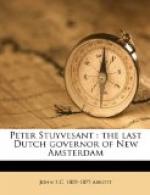It was not needful for the English to be in any hurry. The prey was entirely within their grasp. It will be remembered that Governor Winthrop of Hartford, had joined the expedition. Colonel Nicholls addressed a letter to Governor Winthrop, requesting him to visit the city under a flag of truce, and communicate the contents to Governor Stuyvesant. The Dutch governor came out of the fort to receive the letter, and then returned into the fort to read it. The following was the letter:
“Mr. Winthrop:—
“As to those particulars you spoke to me, I do assure you that if the Manhadoes be delivered up to his Majesty, I shall not hinder but any people from the Netherlands may freely come and plant there or thereabouts. And such vessels of their own country, may freely come thither. And any of them may as freely return home, in vessels of their own country; and this and much more is contained in the privilege of his Majesty’s English subjects. This much you may, by what means you please, assure the governor from, Sir, your affectionate servant,
“Richard Nicholls.
“August 22, 1664. O.S.”
The Council demanded that this letter should be exhibited to the people. The governor refused, saying that it would be quite unfavorable to the defence to communicate such intelligence to the inhabitants. As the council persisted, the governor, in a passion, tore up the letter and trampled it beneath, his feet. The rumor spread rapidly that a flag of truce had come.
The citizens collected in a large and excited gathering, and sent a delegation of three persons to demand of the governor the communication which he had received from the hostile fleet. Threats were uttered. Curses were heard. Resistance was declared to be madness. The universal voice clamored for the letter. The community was upon the eve of mutiny.
At length Stuyvesant yielded. A copy of the letter was made out from the fragments, and it was read to the people. This increased their disposition to capitulate. Still the indomitable governor could not endure the thought of surrendering the majestic province of New Netherland to a force of four frigates. He regarded the movement, on the part of the English, as an atrocious act of highway robbery. But he was well aware that there was no escape from the sacrifice.
In the night he sent a vessel, “silently through Hell Gate,” to the Directors in Holland, with the following laconic dispatch. “Long Island is gone and lost. The capitol cannot hold out long.” When a man’s heart is broken his words are few.
Much of the night the governor spent in drawing up a strong remonstrance, in answer to the message of Colonel Nicholls. All the argument was with the Dutch. All the force was with the English. But when argument and force come into collision in this wicked world, argument must generally yield.




